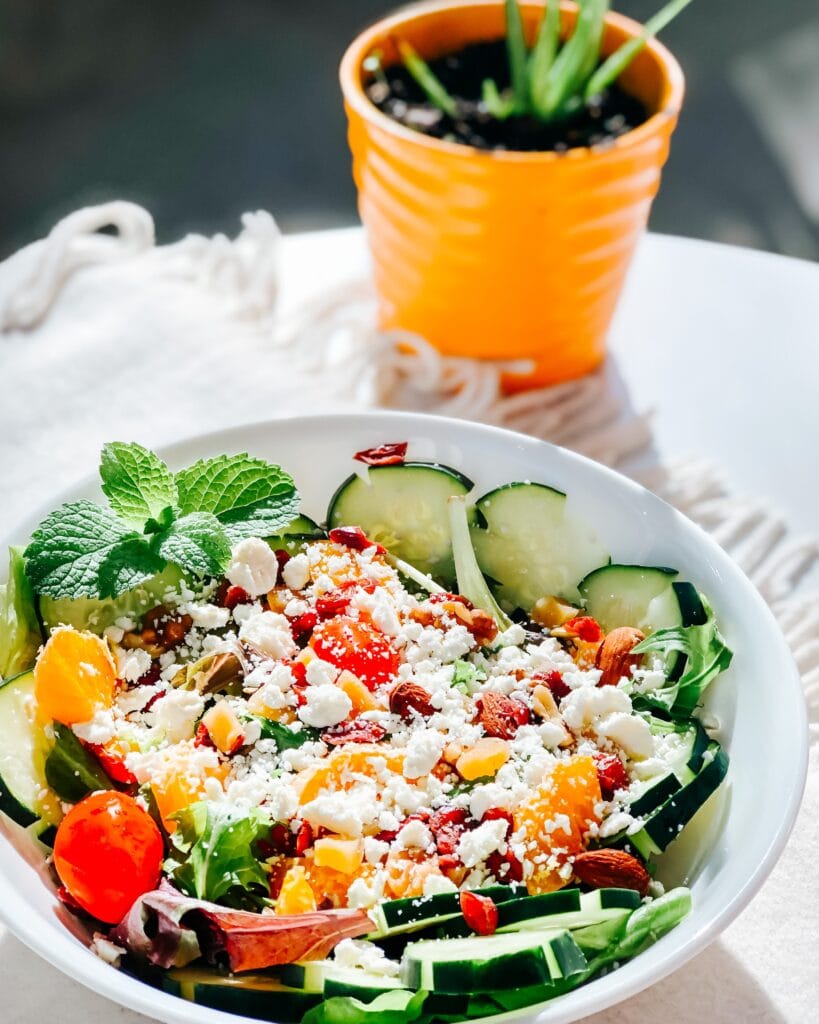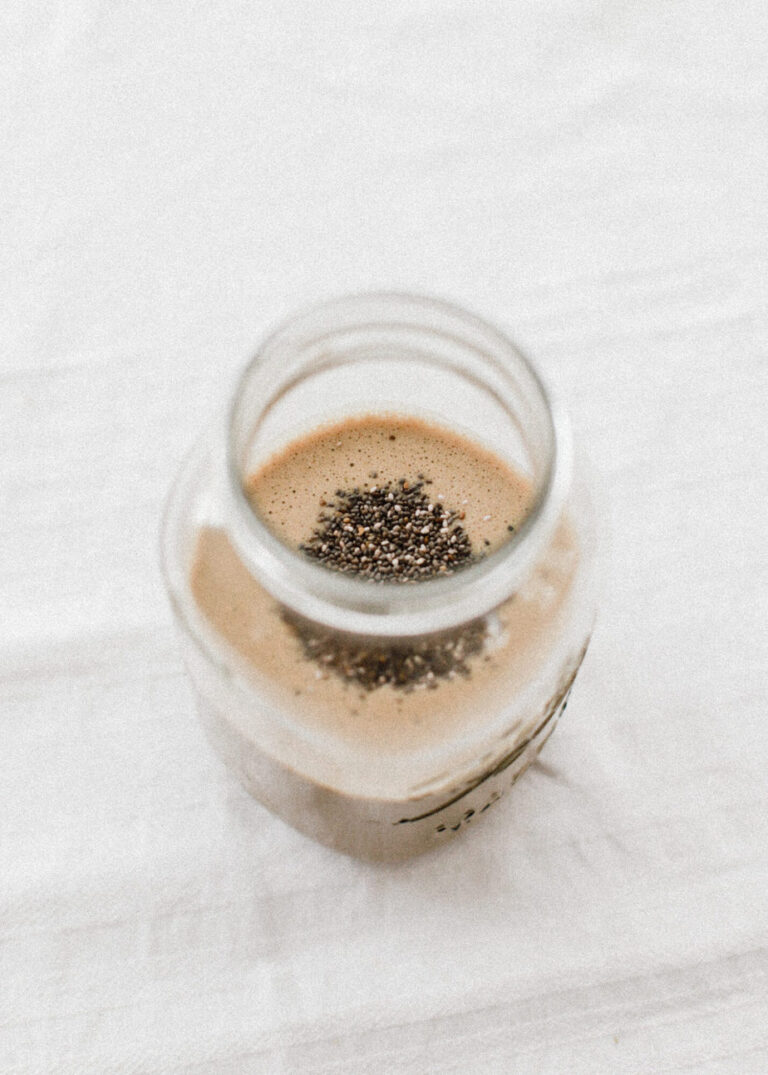Surprising Health Benefits of Greek Salad
We all know salads are supposed to be healthy, but oftentimes there’s a lot of sugar in the dressing. We’re exploring the surprising health benefits of greek salad, and whether it’s actually good to eat!

Lately, my body has been craving vegetables, and to be really specific, salads. This is a new concept to me because, for the first 34 years of my life, I struggled to like, want or enjoy eating vegetables. It amazes me that as soon as I started to eat a rainbow of colors in the form of salads for lunch, my body actually started to look forward to this meal and even crave vegetables when I had a day with some less healthy choices.
One of my go-to salads lately has been a Greek salad. Packed full of colorful vegetables, this salad (even the dressing) is full of amazing vitamins and nutrients your body needs.
Keep reading to find out more about the health benefits of Greek salad, and why you need to include this in your cottage living diet.
Health Benefits of Greek Salad
A Greek Salad is a twist on a classic tossed salad that you can prepare in minutes and contains common ingredients and fresh vegetables you likely usually buy in your weekly grocery run or already have at home. A traditional Greek salad contains only six simple ingredients that when combined will make you question why you’ve been spending your hard-earned money on less-than-amazing grocery store salads.
Let’s break down the Greek salad recipe and the powerful benefits it contains. A Greek Salad contains so many nutrient-dense foods and powerful antioxidants your body needs and craves.
So, what are the six ingredients?
Ingredients for Greek Salad
A typical Greek salad does not normally contain leafy greens or lettuce. If you would like to use lettuce to bulk up your salad, please go for it! I am a volume eater, and even if you tried, you could never eat too much lettuce as it’s essentially just water!
A classic Greek salad dressing is equally as simple. Forget store-bought dressings that are full of chemicals and fillers. The best Greek salad needs a homemade dressing. Fear not, for that classic olive oil dressing, you will only need a few simple ingredients for this classic dish.
Olive Oil Dressing
Greek salad dressing is so much easier than you think. Here’s a quick breakdown of the ingredients you’ll need.

Red Onions
Red Onions are a staple in our household because of how quickly they can add depth of flavor to any dish. They also have virtually no calories and surprising health benefits. Did you know that red onions have been used in traditional medicine for centuries because of their antibacterial anti-inflammatory properties? Red onions are also packed full of antioxidants, which help prevent common colds and keep your digestive system moving as it should. Another amazing benefit is their ability to lower blood pressure and helps your body fight off the risk of heart attacks.
Tomato
Tomatoes are the secret powerhouse vegetable you didn’t know you needed more of in your diet. Including tomatoes in your diet can help protect again cancer, can help you main healthy blood pressure readings, and can reduce your blood sugar level if you are someone with diabetes. Tomatoes are also a great source of dietary fiber and key vitamins such as vitamin C, vitamin K, and Folate. While a traditional recipe uses whole tomatoes, cherry tomatoes can also be used if those are what you have on hand.
Cucumber
Cucumbers are considered a superfood because they are very low in calories but very high in many important vitamins and minerals. Cucumbers actively promote hydration in your body as they are made with mostly water (95% to be exact). Because of their water content, they are a fabulous ingredient for salads or snacking. The other main component of a cucumber is vitamin K which helps prevent blood clots, keeps your bones healthy, promotes healthy vision, helps reduce weight gain/ promotes weight loss and makes sure your vital organs such as your lungs, heart, and kidneys function as they should. Cucumbers also contain beta-carotene which helps fight free radicals in your body.
Bell Peppers
Greek Salads did not always contain bell peppers so this ingredient can be optional. For our salad, we are using green pepper. Bell peppers, while considered a vegetable, are actually mostly comprised of carbohydrates, which account for most of their calorie content. A 100-gram serving contains 6 grams of carbs which are mostly sugars. Don’t let this fool you into thinking they are not good for you. Bell peppers also contain healthy fiber, Vitamin B6, K1, Potassium, Folate, Vitamin E, and A. Bell Peppers promote healthy nerves and muscles, are amazing for those that are pregnant due to their high folic acid, and help improve heart health.
All the best drink recipes
3-2-1 Aperol Spritz
One of the best and easiest drinks to make! The Aperol Spritz is perfect for summer afternoons at the cottage, or winter evenings at the cabin.
Kalamata Olives
Greece has the perfect climate for olive trees which is why Greece is home to over 60 different types of olive species. Kalamata olives are almond-shaped and have a deep brown-purple color and have played a role in human nutrition for thousands of years. Kalamata olives may be most known for their ability to reduce your risk of heart disease because of their presence of hydroxytyrosol or healthy fats. This antioxidant has been shown to decrease LDL (the bad cholesterol) and increase HDL (the good cholesterol). Kalamata olives also contain powerful antioxidants and vitamins such as Iron, Calcium, Magnesium, Potassium, and vitamins A and E.
Feta Cheese
Feta Cheese is a soft, white-colored cheese typically made from milk or sheep or goats. One of the oldest cheeses in the world, it’s known for its rich aroma and slightly sour taste. Feta cheese is slightly higher on the sodium index, but when eaten in moderation, it has some powerful health benefits. The cheese also contains more calcium than many other kinds of cheese which helps promote healthy teeth and bones. But it also contains a fatty acid known as conjugated linoleic acid (CLA) that has been shown to help reduce body fat.
Another benefit of feta cheese is of course gut health. Fermented foods like feta contain probiotics that promote a healthy gut and strong immune system. For those with Type 1 or 2 diabetes, feta cheese will make a great addition to your diet because it is an excellent source of protein and calcium and can help control your body’s blood sugar levels.
Olive Oil
Olive oil has so many proven benefits, we could write an entire article on that alone. It’s rich in monounsaturated fatty acids and contains large amounts of antioxidants.
The oil was actually a key staple in the diets of the ancient Greeks and continues to be used worldwide today. Which is good, because it’s known to have strong anti-inflammatory properties and is a great choice for those with a risk of health problems. On top of so many other incredible health benefits, it’s been proven to prevent strokes, heart disease, weight gain and obesity, Alzheimer’s disease, type 2 diabetes, and arthritis.

Red Wine Vinegar
Vinegar is made by fermenting a carbohydrate source into alcohol. While this may sound unhealthy, vinegar actually has many nutritious benefits. Red wine vinegar may lower blood sugar levels, helps fight skin cancers such as melanoma, helps with weight loss, and contains many powerful antioxidants.
Isn’t it amazing how a few simple ingredients can give your body so many nutritional benefits? A Greek salad may be the healthiest salad you can make.
Now that we know there are actually a lot of health benefits to greek salad, we’ll share the actual recipe below! I promise it’s super easy.
How to Make Greek Salad

Fun Fact: While this salad is best enjoyed fresh, if you keep the salad base separate from the salad dressing, you can keep all of it fresh in the fridge for several days. Simply shake the dressing and pour the desired amount on your next salad portion.
- Cut the vegetables into large chunks. The cucumbers, tomatoes, and red onion will be your main ingredients. If you prefer smaller chunks, that is ok too! In a classic salad, you will find red onion slices with chunky tomatoes and cucumber. You can use as much or as little of each of these three ingredients as you wish. There are no real measurements when it comes to Greek Salad. Be sure to use a big bowl so you can easily mix at the end.
- Next, place the pitted Kalamata olives on top. If all you have is black olives at home, these will also work perfectly well.
- Mix all of the dressing ingredients in a mason jar or bowl. We have given measurements that will work for 2-3 large salads.
- Drizzle your desired amount of dressing onto the salad.
- Top with the satisfying feta cheese crumbles.
- Serve immediately to enjoy the health benefits of a Greek salad.
This vibrant salad can be served as both a main or side dish.
TOOLS YOU’LL NEED







